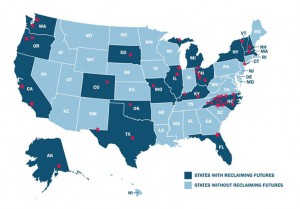By Bridget Murphy, August 26 2016
As many of you know, Reclaiming Futures was awarded a Conrad N. Hilton Foundation grant in September 2014. The purpose of this grant is to develop, pilot test, evaluate, and disseminate a new version of SBIRT for youth at risk for deeper involvement with the juvenile justice system. As a first step, Reclaiming Futures issued a request for proposals and awarded five sites to help us in the endeavor. The sites selected, through a competitive process, were:
- Chittenden County, Vermont
- King County, Washington
- Mecklenburg County, North Carolina
- Nassau County, New York
- Washington County, Oregon
Subsequently, in April 2016, using local resources, four sites in Ohio joined our SBIRT initiative. These sites include:
- Hocking County
- Lucas County
- Montgomery County
- Northwest Ohio - Three County Collaboration (Williams, Henry, and Defiance Counties)
We are wrapping up the second year of the Hilton funding and have some exciting updates. Before I share our collective accomplishments and upcoming directions, let me provide a little information about SBIRT and Reclaiming Futures’ version of SBIRT.
As you may know, SBIRT is a population health approach designed to offer universal screening to help identify individuals in need of behavioral health supports, services, and/or treatment (substance use or mental health). Historically, SBIRT has been implemented in primary care settings and is used to detect unhealthy alcohol or other drug use and to intervene in order to prevent further problems or severity. Our project is unique as we are working in juvenile justice settings. The goal is to combine public health and justice approaches to identify, intervene, and refer youth who are in the pre-adjudication phase to prevent further penetration in the justice system. There is another Hilton funded project working in juvenile justice being led by the National Center on Mental Health and Juvenile Justice (NCMHJJ). Together, Reclaiming Futures and NCMHJJ will be able to offer important implementation considerations about SBIRT in juvenile justice settings.
Reclaiming Futures executive director Evan Elkin and his colleagues developed our four-session brief intervention. It is strength-based and uses Motivational Interviewing as a way to engage youth and families. The intervention allows the youth to examine how behavioral health concerns might be influencing their goals. It also encourages parents/caregivers to create empathetic environments by remembering their own experiences as a youth and learning about adolescent development. In addition, it reminds project staff to take time to gain insight about the context of a family’s situation prior to making justice, treatment, or community decisions. While we are still early in implementation, we are optimistic about the promising benefits to families - as the SBIRT coordinator at one of the pilot sites said:
“I can’t fully express the beauty and joy that are these sessions. The rapport that is built through the activities in the parent session that dovetails so gracefully into the parent/youth session is profound. Every time I have a session I benefit from the experience of a deeper and sometimes in that moment unearthed, if only for a short time, bond between a parent and their teen. It is an honor every time to witness parents with their children in those moments. The activities allow me to be a trusted bystander while the family interacts. It is seriously awesome.”
–Katherine Wiley, Washington County, Oregon
We have some other notable accomplishments since beginning implementation:
- Through a competitive process, we hired an external evaluator to conduct a cross-site process and outcome study - Impact Justice is leading it. This included designing research protocols, training project staff on participant protections, and obtaining Portland State University Institutional Review Board and National Institutes of Health, Certificate of Confidentiality approvals
- Developed and implemented a screening tool and feedback report that combines strength-based questions with the Global Appraisal of Individual Needs – Short Screener
- Engaged sites to provided us with invaluable feedback for refining the intervention and implementation process
-
As of the end of June, 2016, we have:
- Enrolled 36 youth into the evaluation and they are in some phase of the project (intervention; follow up)
- Trained 165 providers. Providers are defined as individuals who are implementing or supervising the implementation of SBIRT
- Distributed SBIRT related materials to 403 people (PowerPoint slide deck; manual)
- Completed 44 monthly implementation calls
- Hosted SBIRT-specific monthly Learning Collaborative calls. Rates of staff attendance vary by site, but, on average, staff have participated in 89% of the calls
- Disseminated Reclaiming Futures version of SBIRT through formal activities (e.g., presentation); we have reached approximately 435 people
Futures Directions:
We recently held a Training of Trainers (ToT) event to increase our capacity for training with current sites and for sustainability purposes. We continue to expand by seeking other partners in schools and juvenile justice settings. For example, recently in collaboration with the Center for Court Innovation, we have begun working on a Tribal version of SBIRT. The evaluators will be conducting on-site visits with the Hilton funded grants to examine the process of implementation.
If you would like more information, please feel free to contact us.
Topics: Adolescent Mental Health, Adolescent Substance Abuse Treatment, data, Family Involvement, SBIRT, strength-based, treatment
Updated: March 21 2018

